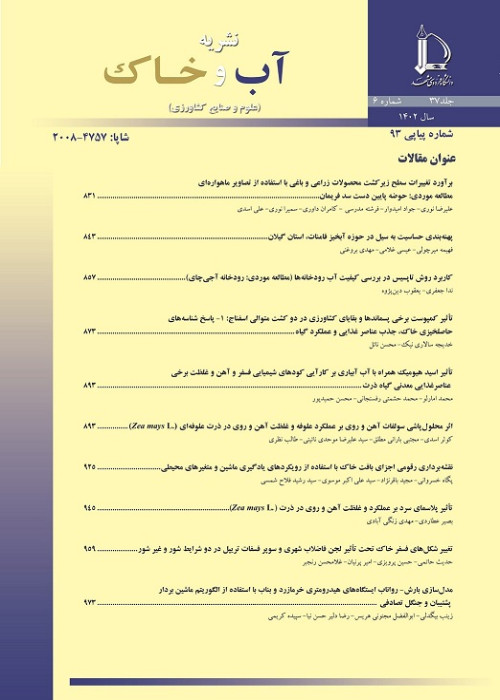Evaluation of Wastewater Effects on Soil Chemical Characteristics, Microelements Concentration, Heavy Metals Accumulation and Mize Yield (Single Cross 704)
Increased agricultural activities, the occurrence of successive droughts, and limited freshwater resources, along with increasing population, have made a priority for the importance of protecting water resources in programs of developed and developing countries. Due to the climatic conditions in Iran, which has a wide range of arid and semi-arid characteristics, facing the challenge of water resources crisis, is inevitable. Therefore, the use of wastewater is very important.
This research was conducted in the research farm of Sari University of Agricultural Sciences and Natural Resources (SANRU), which has a silty clay soil texture. The latitude and longitude of the region are 36º 40ʹ N and 53º 04ʹ E, respectively. Its height above sea level is 21 meters. According to Demarten classification, Sari city has a temperate humid climate. The long-term average temperature of Sari is 11.18 °C and the total long-term rainfall is 780 mm. In order to evaluate the wastewater effects on soil chemical characteristics, microelements concentrations, heavy metals accumulation and Maize yield (Single Cross 704), an experiment was carried out as factorial based on a completely randomized design with treatments included; Water source factor (wastewater (A1), well water (A2)), Irrigation (subsurface method (I1) and (drip method (I2)) with three replication in 2018-2019 under lycimetric conditions, at the Sari Agriculture and Natural Resources University (SANRU), Iran.
According to this study results, the effect of type of irrigation source on soil electrical conductivity, soil microelements and heavy metals accumulation of the soil was significantly different (P ≤ 0.01). The highest soil electrical conductivity with a value of 1.8 dS.m-1 was observed in the conditions of using treated wastewater. The highest amount of total nitrogen, phosphorus and potassium were related to the source of treated wastewater with values of 0.086, 24.2 and 222.2 mg.kg-1, respectively. The results showed that the accumulation of soil Pb (0.07) and Cd (0.014 mg.kg-1) in irrigation with treated wastewater increased compare to the well water source by 0.05 and 0.010 mg.kg-1, respectively. Also, the effect of irrigation method and the interaction effect of source and method irrigation on soil chemical characteristics, microelements concentration and heavy metals accumulation were not significant. The use of wastewater by increasing soil stability improves soil physical condition, increases soil fertility, increases photosynthetic products, increases the efficiency of plant photosynthetic system and ultimately improves plant growth. The use of subsurface irrigation resulted in a 67% increase in grain yield and 28% increase in biomass productivity compared to the drip method. Adequate nutrients during the reproductive growth stage of the plant play an important role in grain growth. Therefore, it can be said that the nutrients in the wastewater have increased the grain yield compared to using the well water source. Because the wastewater contains nutrients and micronutrients such as; nitrogen, phosphorus, potassium, calcium, zinc and iron were relative to the well water source and increased maize grain yield. The results showed that the use of effluent compared to well water, caused the absorption of more heavy metals lead and cadmium in the grain, leaf and stem of maize. Due to the use of wastewater water source, the amount of Pb uptake among different parts of the maize, with values of 27.2, 22.5 and 20.5 mg / g, respectively, related to the grain, leaf and stem. However, the uptake of Cd in the grains, leaves and stems was 2.32, 1.35 and 2.01 mg / g, respectively. According to the results, the high concentration of heavy metals Pb and Cd due to the use of wastewater in the grain sector directly threatens human health. Also, the concentration of heavy metals Pb and Cd in the leaf and stem parts of corn, by endangering the health of livestock and poultry, indirectly affects human health.
The results showed that irrigation with treated wastewater due to its richness in nutrients and microelements, improves soil fertility and creates favorable conditions by increasing soil organic matter and mineral for plant growth. Also, according to the permissible threshold values of the concentration of heavy metals Pb and Cd in plants, the accumulation of heavy metals Pb and Cd in the grain, stem and leaf of single cross 704 corn, will not be a problem for consumers. Optimal use of wastewater can increase soil fertility and the ability of plants to absorb nutrients from the soil and ultimately increase plant yield.
- حق عضویت دریافتی صرف حمایت از نشریات عضو و نگهداری، تکمیل و توسعه مگیران میشود.
- پرداخت حق اشتراک و دانلود مقالات اجازه بازنشر آن در سایر رسانههای چاپی و دیجیتال را به کاربر نمیدهد.


